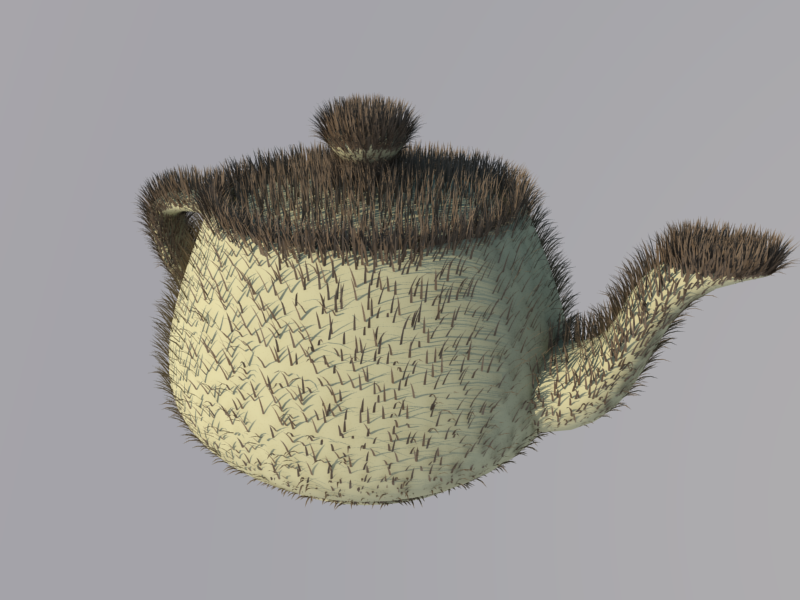[Plugin] Make Fur v.2.1.0(20140323)
-
@unknownuser said:
@rickgraham said:
Umm my dialog box for furmaker is blank.

Rick
[attachment=0:aem2yrs3]<!-- ia0 -->2010-05-05_11.10.52.png<!-- ia0 -->[/attachment:aem2yrs3]
same here..
no fur for osx
Wonder how hard it would be to make it Mac-friendly? This looks like something that would have great benefit for myself and my line of work.
Rick
-
hmmm!

would be nice to be able to pre-select the material though. i had to paint the branches green and then back to brown after.
-
Great Plugin! I'm in the process of reviewing it for my site. But I keep running into an issue, whenever I select my settings and then click the "Fur" button it creates the fur on the wrong side of the face. Always facing down. Is there a way to fix this?
Thanks for your efforts!
-
Make sure your face is orientated correctly.
-
Hi, Jeff and rick.
I update Fur_en.rbThe WebDialog has problem in Mac OSX.
So I put another menu for the correspondence of this problem.
The menu named "fur!(MAC)".
Using InputBox Dialog.
How in this? -
@su reviewer said:
Great Plugin! I'm in the process of reviewing it for my site.
Very nice site. I've not seen it before. New?
-
Yes, Wow thanks for this. I got a feeling some real interesting things will happen with this plugin.
-
how can we access the component instance option? also did you consider the color preselect or a don't copy material option?
also if it would remember settings from 1 usage to the next would be great. a drop down with saved presets would be even better.
-
@tak2hata said:
Hi, Jeff and rick.
I update Fur_en.rbThe WebDialog has problem in Mac OSX.
So I put another menu for the correspondence of this problem.
The menu named "fur!(MAC)".
Using InputBox Dialog.
How in this?Works great now, many thanks!
If I can make one little suggestion - I'm not sure if the PC guys are the same or not, but when the dialog box comes up, it is right in the middle of the screen and I have to move it each time. Is there a way to have come in some place other than center? And I would love to see documentation of what the various controls do.
Again, thanks for the great plugin.
Rick
-
i knew i should have popped that before it got out of hand!

who would have ever imagined fur for SU?????????????????????????????
-
@rickgraham said:
@tak2hata said:
Hi, Jeff and rick.
I update Fur_en.rbThe WebDialog has problem in Mac OSX.
So I put another menu for the correspondence of this problem.
The menu named "fur!(MAC)".
Using InputBox Dialog.
How in this?I cannot tell what the intended difference between the 1 - Linear and 2- Arch are. By the way, the Mac only shows 1,2,3,4 - I saw another persons screen shot which showed me what they were for.
Rick
-
@tak2hata said:
Hi, Jeff and rick.
I update Fur_en.rbThe WebDialog has problem in Mac OSX.
So I put another menu for the correspondence of this problem.
The menu named "fur!(MAC)".
Using InputBox Dialog.
How in this?yep, we're growing some fur now

thanks!

-
Was just a matter of time until someone posted hairy balls.

-
i can hear all the script writers now
"Why the fook didn't i think of that? , its so fookin simple too!
, its so fookin simple too!  "
"

awsome, simply awsome!
-
@xrok1 said:
i can hear all the script writers now
"Why the fook didn't i think of that? , its so fookin simple too!
, its so fookin simple too!  "
"

awsome, simply awsome!
This is a banner day for me and SU.
Rick
-
Wow...I am speechless...fur for Sketchup!




_KN
-
Mandatory:

-
Absolute fantastic
Somehow I can't seem to generate short hair?
I set the "Lenght" to 0.0001 but the hair doesn't seem to get shorter then approx. 50 mm!It would be nice to be able to save presets!!!
Great job

-
Teddy fur.
Which all but choked SU to death.

-
Really nice one I missed from a long time... Thanks.
Advertisement







